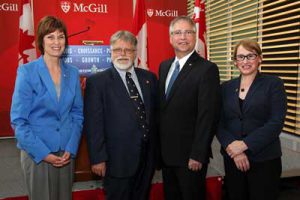
By McGill Reporter Staff
Calling it “gold medal research at its best,” the Honourable Gary Goodyear, Minister of State for Science and Technology, yesterday announced the formation of three new Networks of Centres of Excellence (NCE) – including BioFuelNet Canada, which will be led by Don Smith, James McGill Professor in the Department of Plant Science. The two other Centres are the Technology Evaluation in the Elderly Network, based at Queen’s University; and the Marine Environmental Observation, Prediction and Response Network, based at Dalhousie University.
In all, the government is investing $73.8 million over the next five years to fund the networks – money well spent, said Goodyear.
“Our government’s Economic Action Plan 2012 focuses on the drivers of growth and job creation – innovation, investment, education, skills and communities,” Goodyear said in a press conference held in the Francesco Bellini Life Sciences Building. “Improving health care, sustaining the environment and managing natural resources are three very important priorities for Canadians and focusing research investments on these areas will build a more sustainable future for all Canadians.”
Funding was awarded to the three new NCEs following a competition to assess applicants’ research proposal, training program, level of networking and partnerships, knowledge-transfer activities, and management. BioFuelNet Canada will receive close to $25 million from the NCE program.
Ambitious biofuel goals
“Our goal is to develop the knowledge, the tools and the policies so that 25 per cent of the fuel used in Canada will come from advanced biofuels within 10 to 20 years,” said Smith, Scientific Director of BioFuelNet Canada. “We are looking at sources for fuel that are as varied as forestry and agricultural residue and fast-growing plants such as switchgrass, as well as those from algae, processed paper waste, sewage and trash.”
With close to 100 researchers from almost 25 institutions across Canada, the network includes most of the researchers who are working in biofuels in the country. They will be divided into four regional platforms (West, Prairie, Central, and East) that will focus on the sources, conversion processes, uses and sustainability practices that are most appropriate for each area. At the same time, by being integrated into a national network, investigators will benefit from the synergy of the shared research process.
“The Biofuel Network will help integrate many research and commercialization efforts across the country and help generate biofuel jobs all across the country in large and small communities,” said Suzanne Fortier, President of the Natural Sciences and Engineering Research Council and President of the Networks of Centres of Excellence Steering Committee. “We all know how important that is for our future.”
Stringent review process
NCEs are large-scale, academically-led virtual research networks that bring together partners from academia, industry, government and not-for-profit organizations. For more than 20 years, the NCE program has successfully brought together the best minds in many disciplines and sectors to find solutions to critical issues for Canadians, and has leveraged more than $386 million in industry cash and in-kind support.
“It is not easy to become a Network of Centres of Excellence,” said Fortier. “It involves an enormously rigorous expert review system that has several layers, so it is a very difficult competition… The three networks that are being celebrated today have met the bar of excellence.”
Addressing Smith directly during the press conference, a smiling Heather Munroe-Blum reiterated Fortier’s assessment of the NCE competition. “Don, I do know the blood, sweat and tears that have gone into building this program to where it is,” said the Principal. “We lived through the remarkable international review that was put together by the NCE program under Dr. Fortier… and [it took] literally an army [of people] of extraordinary dimension and diversity … to create this new centre.”
BioFuelNet Canada, will be housed in Montreal’s Griffintown district at the new Quartier de l’Innovation – an ambitious partnership between McGill and École de technologie supérieure that brings together academic programs, student internships, entrepreneurs, established industries large and small, technologies, and the support services required to coordinate and sustain them.
